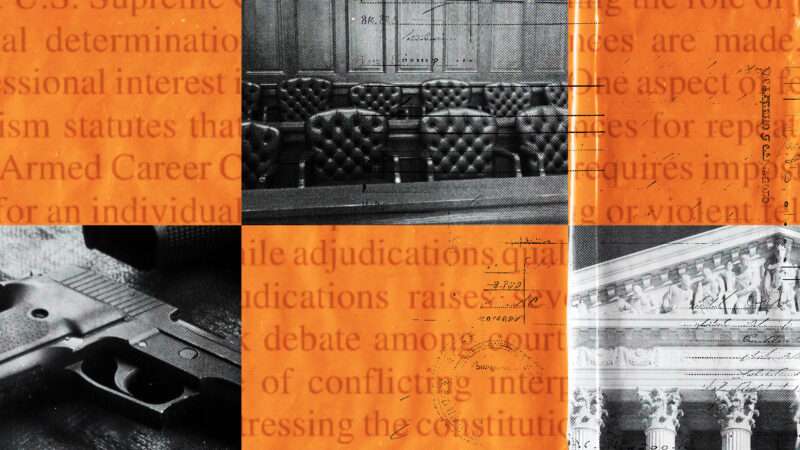
The Supreme Court on Friday ruled that the right to a trial by jury and to due process apply to people who face a steep sentencing enhancement under federal law, in a ruling that transfers some power from the hands of judges to the public and will affect many criminal defendants' future punishments.
The procedural history of the case is a bit of a whirlwind. But at its center is Paul Erlinger, who was charged in 2017 with being a felon in possession of a firearm and sentenced to 15 years under the Armed Career Criminal Act (ACCA), which increases the punishment for that offense—felon in possession of a firearm—from a 10-year maximum to a 15-year minimum if the defendant has been convicted previously of three violent felonies or serious drug offenses on separate occasions.
At sentencing came one of the initial twists, when the judge who handed down the 15-year punishment made clear it was inappropriate. Erlinger, who pleaded guilty, had gained steady employment, started a family, and remained drug-free in the more than a decade since his previous convictions, so a five-year sentence, the judge said, would be "fair." But under the ACCA, the court's hands were tied.
Then came the U.S. Court of Appeals for the 7th Circuit, which said shortly thereafter that two of Erlinger's offenses considered for the purposes of the ACCA did not actually qualify as violent felonies or serious drug crimes. Prosecutors, however, were undeterred. They returned to court and invoked convictions related to burglaries Erlinger committed 26 years before the felon in possession of a firearm charge, when he was 18 years old. Erlinger countered that the burglaries in question had been a part of one criminal episode—not distinct events as the ACCA requires—and that, most importantly, a jury would need to make the consequential determination about the separateness of those offenses.
The sentencing court disagreed, ruling it was the judge's decision and that the court was bound by the ACCA, thus reimposing the 15-year sentence that it once again called "unfortunate" and "excessive."
But Justice Neil Gorsuch, writing for the 6–3 majority opinion, explained that Erlinger did indeed have the 5th Amendment and 6th Amendment right to ask a jury whether those offenses were committed separately and if he is therefore vulnerable to the massive increase in incarceration that the sentencing court itself characterized multiple times as unjust. The outcome was at least somewhat predictable when considering yet another twist: After Erlinger appealed on the grounds that his constitutional rights had been violated, the government agreed. But the 7th Circuit still refused to reconsider his sentence, leaving Erlinger to ask the Supreme Court.
Core to Gorsuch's opinion is Apprendi v. New Jersey (2000), a Supreme Court precedent that ruled it was unconstitutional when a judge sentenced a defendant more harshly on the basis that a shooting had allegedly been motivated by racial animus, because no jury considered or made any determination beyond a reasonable doubt on that factor. A jury and a jury only, the Court ruled, may find "facts that increase the prescribed range of penalties to which a criminal defendant is exposed" when it will cause the penalty to exceed the prescribed statutory maximum.
But Gorsuch also says the Court has something else on its side today: history. "Prominent among the reasons colonists cited in the Declaration of Independence for their break with Great Britain was the fact Parliament and the Crown had 'depriv[ed] [them] in many cases, of the benefits of Trial by Jury,'" he writes. "The Fifth and Sixth Amendments placed the jury at the heart of our criminal justice system" in order "to mitigate the risk of prosecutorial overreach and misconduct" and serve as a check on the government.
This is not a novel area for Gorsuch, who has made clear his respect for the right to a trial by jury. Last month, he rebuked the Court's demurral from hearing a case concerning Florida's use of six-person juries as opposed to the traditional, historical practice of using 12-person panels.
Though much has been made of the ideologically fractured nature of the current Court, the decision in Erlinger did not fall neatly along partisan lines. Among the dissenters were Justices Samuel Alito, Brett Kavanaugh, and Ketanji Brown Jackson, the latter of whom argued that Apprendi—and, as an extension, the case law that has sprung from it—was wrongly decided. "I recognize that many criminal defendants and their advocates prefer the Apprendi regime, which provides some defendants with more procedural protections at sentencing," Jackson writes. "In my view, however, the benefit that some criminal defendants derive from the Apprendi rule in the context of their individual cases is outweighed by the negative systemic effects that Apprendi has wrought," which she says has hamstrung judges and increased sentencing disparities.
"The only thing judges may not do consistent with Apprendi is increase a defendant's exposure to punishment based on their own factfinding," counters Gorsuch. "Does Justice Jackson really think it too much to ask the government to prove its case (as it concedes it must) with reliable evidence before seeking enhanced punishments under a statute like ACCA when the 'practical realit[y]' for defendants like Mr. Erlinger is exposure to an additional decade (or more) in prison?"
The post The Supreme Court Again Strengthens the Right to a Jury Trial in Criminal Sentencing appeared first on Reason.com.







